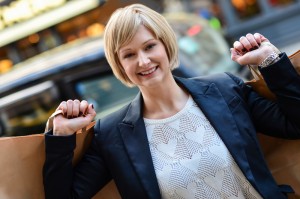 In a survey of supermarket consumers researchers found that young and old shoppers were less likely to purchase fairtrade and organic goods at supermarkets, with the findings going against the commonly held view that people become more ethical as they get older.
In a survey of supermarket consumers researchers found that young and old shoppers were less likely to purchase fairtrade and organic goods at supermarkets, with the findings going against the commonly held view that people become more ethical as they get older.
Younger shoppers talked a lot about buying ethical goods, but failed to practice what they preached, with the survey finding they recommended ethical products more than older consumers, but were less likely to purchase them.
And despite the perception that women are more ethical than men, the survey found no difference between the shopping habits of the two genders. Warwick Business School,
Kevin Morell, of Warwick Business School, @warwickbschool said: “There is the perception that in general people become more ethical as they get older or that today’s young are more in tune with ethical buying and the environment.
“But we were surprised to find that it was the middle-aged who were the ethical shoppers. We found a ‘curvilinear’ relatoinship between age and purchasing fairtrade and organic products: both older and younger respondents were less likely to purchase ethical goods than middle-aged respondents.
“Age was also associated with the extent to which people would recommend fairtrade goods, with the oldest respondents also being least likely to recommend fairtrade products to others. This also suggested that younger shoppers were not entirely ‘practising what they preached’.
“Overall, we did not find that gender had any effects on recommendation or purchasing of fairtrade or organic food.”
In the study, Ethical consumption behaviours in supermarket shoppers: determinants and marketing implications, published in the Journal of Marketing Management, Professor Morrell, Chanaka Jayawardhena, of Hull University Business School, and Chris Stride, of the University of Sheffield, questioned 688 shoppers at three UK supermarkets, with 53 per cent of them women, just under half aged under 30 and around 20 per cent 50 years-old or more.
Professor Morrell added: “The findings may reflect that both younger and older consumers have less disposable income, especially as fairtrade and organic goods are often more expensive. Certainly, it might explain why younger shoppers recommend ethical foods, but don’t then buy them as they simply can’t afford it.
“Older shoppers might just be more engrained in their shopping habits and not as aware of the move to fairtrade and organic foods. Or it might be that younger and older shoppers are purchasing from a smaller pool of products than those middle-aged consumers doing a family shop.
“It may also reflect that there is greater awareness of some of these pro-social issues among younger consumers and that older shoppers are more settled in their shopping habits.”
The study’s findings have implications for marketers and organisations aiming to promote fairtrade to tackle the exploitation of workers and those looking to protect the environment and animal welfare.
“Our work shows that values play an important part in how many consumers shop, with many aware that their buying habits can have a direct impact on people’s working conditions or the environment,” said Professor Morrell. “Marketers need to take that into consideration and make sure it is part of their marketing mix.
“We know a lot of decision-making in supermarkets is almost sub-conscious and so ethical shopping could be enhanced by useful visual cues and subtle features in the layout of the store that could align with these values.”
Warwick Business School, located in central England, is the largest department of the University of Warwick and the UK’s fastest rising business school according the Financial Times. WBS is triple accredited by the leading global business education associations and was the first in the UK to attain this accreditation. Offering the full portfolio of business education courses, from undergraduate through to MBAs, and with a strong Doctoral Programme, WBS is the complete business school. Students at WBS currently number around 6,500, and come from 125 countries.
Just under half of faculty are non-UK, or have worked abroad. WBS Dean, Professor Mark P Taylor, is among the most highly-cited scholars in the world and was previously Managing Director at BlackRock, the world’s largest asset manager.
Kevin Morrell is Head of the Strategy and International Business Group, and specialises in understanding Public Sector Organisations.He has authored or co-authored three books and published more than 30 scholarly articles. His research has been published in leading journals including Journal of Management Studies, Accounting Organizations and Society, Public Administration Review, Public Administration (where he won the Haldane Prize for best paper in 2012) and Human Relations. Professor Morrell serves on the editorial board of the British Journal of Management. He is also Director of the Multicultural Scholars Programme.
Please visit Professor Morrell’s personal website for more detail.
Graphic by Shutterstock
